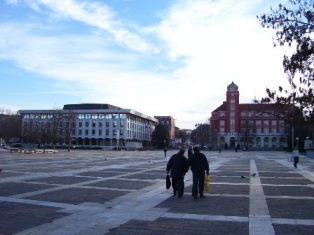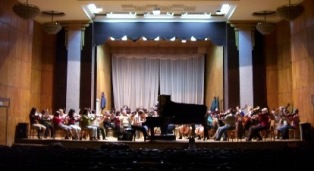East of Northern: NKU Opens Up
Mary Ellyn Hutton
Posted: Apr 12, 2007 - 12:00:00 AM in
news_2007

David Cole and Kurt Sander in Pleven, Bulgaria
|
Northern Kentucky University is looking east. All the way to Eastern Europe.
NKU colleagues David Cole, Diana Belland and Kurt Sander made the trip in January to Pleven, Bulgaria, where they participated in a joint concert with the Pleven Philharmonic Orchestra.
Cole, director of orchestral studies at NKU, conducted. Belland, a member of the NKU piano faculty, was guest artist in Beethoven’s Piano Concerto No. 3.

Pianist Diana Belland rehearsing with the Pleven Philharmonic
|
The concert opened with the world premiere of theory/composition professor Sander’s “Pantocrater.”
Funded by an$8,000 faculty project grant, the trip inaugurated NKU’s “East of Northern International Arts Initiative,” a program created by Cole, Sander and Belland to generate arts experiences with Eastern European countries.
“East of Northern” is part of a larger effort to increase NKU’s international presence, said Kevin Corcoran, dean of arts and sciences.
“We recognize that we’ve got to pay attention to more than our own backyard, both with respect to getting NKU’s name out and recruiting students from other parts of the world, and to get our students and faculty out to other parts of the world.”
NKU’s international thrust reflects “Vision 2015,” a 10-year strategic plan developed by a team of community leaders co-chaired by NKU president James Votruba. One of the objectives of “Vision 2015” is to make Northern Kentucky a stronger participant in the global economy.
Eastern Europe was already familiar territory for the NKU music department.
“We’re not creating something artificial,” said Sander, who calls himself the “gatherer” for the “East of Northern” project. “There are so many people here doing things that are involved with Eastern Europe already.”
Pianist Sergei Polusmiak, artist-in-residence at NKU and “honored artist of the Ukraine,” has students Ukraine and Uzbekistan. Composer Sander, choir director at St. George’s Russian Orthodox Church in Blue Ash, is a specialist in Russian Orthodox music. Music department chair Vance Wolverton has published an edition of Baltic choral music. Pianist Belland served on the jury of the Lugansk (Ukraine) International Piano Competition in 2000.
“It just seemed natural to focus our efforts toward a program that would help solidify our interests. We’re taking what we have and strengthening it.”
If Sander was the “gatherer” for the “East of Northern” initiative, Cole spearheaded the Pleven project
“A friend of mine alerted me to the Professional Development Program for Conductors (directed by Tanya Tintner, widow of Viennese conductor Georg Tintner). It’s an organization where you tell them what sort of concert you want to do, the size and proficiency of the orchestra, and they match you up with a group in Eastern Europe. Most of the placements are in Bulgaria, Rumania, Poland and the Czech Republic.
“You pay a fee. For four rehearsals, a dress rehearsal and a concert with the (Pleven) orchestra for a week was less than $3,000. That gets you maybe two minutes with the Cincinnati Symphony.”
Housing in Pleven was “remarkably inexpensive,” said Cole. “Each of us got a suite in the hotel and it came to a whopping $60-$70 a night. Some people have horror stories about hotel conditions in Eastern Europe, but we really had none of that.”
The Pleven Philharmonic was “marvelously musical,” he said. “They were so sensitive I thought, ‘wow, this is like driving a Rolls Royce or a Ferrari.’” The first rehearsal of “Pantocrater” was a read-through. “There were some rough things, but by the next morning the whole piece had cleaned up without me doing anything.”
Belland, a Juilliard graduate who performed with the Philadelphia Orchestra at 16, said she was “aware that they were supporting me well, but when I listened to the CD, I was really impressed.”
For the entire week, “five rehearsals and the concert, people in the orchestra probably made no more than $100,” Cole said. The other work on the program (which received a standing ovation) was Dvorak’s Eighth Symphony.
The audience received Sander’s piece “very well,” said Cole, formerly director of orchestras at the University of Utah and one of four conductors to record the national anthems heard during the 2002 Winter Olympics in Salt Lake City, “I think they felt like it was speaking to their culture.”
Sander, whose music has been performed at the annual CREDO Orthodox Choral Festival in Tallinn, Estonia, describes “Pantocrater” (Greek for “Ruler of all”) as a musical rendition of the circular icon of Christ found in the dome of Orthodox churches. To suggest a circle, he used musical palindromes (melodies heard the same forwards and backwards). There are three sections, representing the angels and Old Testament prophets that surround Christ and Christ himself.
Glitches on the trip were mostly travel-related a 90-minute delay leaving Cincinnati (they were re-routed successfully), temporarily misplaced luggage (Sander’s). And there were the inevitable language problems (Sander’s Russian got them through most of the time).
Belland said she wanted to interview their interpreters, a pair of “dear, sweet” school girls, but had no time. “I had heard a program on NPR about rock music in Bulgaria and thought, ‘wow, this fits into the course I’m teaching’ (“Music and Tyranny”). Since the Communist era ended, they’re allowed to play American rock music, which they not only like, but gives them a way to express their pent-up feelings of rebellion against repression. I’m still hoping I might contact them and do some research.”
“East of Northern” reaps mutual benefits.
For performers like Belland, with heavy teaching responsibilities, the solo opportunities are “revitalizing,” she said. (Belland performed the same Beethoven Concerto with the NKU Philharmonic Monday evening at Greaves Hall).
For Cole, now in his fourth year at NKU, it afforded the opportunity to work with a professional orchestra. “As a university orchestra conductor, he doesn’t have a lot of opportunities to work with professional orchestras or to do some of the repertoire that might be very challenging for a student orchestra. For instance, it would be a stretch for our students to do Kurt’s piece right now.”
The former Communist-bloc countries benefit from renewed exposure to the arts.
“They’ve been deprived for a number of years of anything resembling free expression of art,” said Corcoran. “It’s been a very traditional approach, with political statements.”
“East of Northern” is a project-to-project undertaking, Sander said. “We’re looking at other grant sources right now. There are programs out there that facilitate interaction with former Soviet Republics.”
Potentially in the offing a Bulgarian-American music festival next spring at NKU featuring artists they met on their visit.
Cole is working on a piano concerto workshop with Polusmiak, to be held annually or biennially in Ukraine (Kiev or Kharkiv). “Sergei would work with students from all over the world to train them in the art of performing with an orchestra.”
Cole also plans another venture like Bulgaria, but in a different city, possibly St. Petersburg. “This time, I would tie it in with another department on campus, like art or history. There would be a concert and the trip would provide research opportunities and possibly a one-week class for faculty and students centered around some aspect of the city’s culture.”
Meanwhile, the NKU theater department is taking “Man of La Mancha” to the Sibiu International Theatre Festival in Romania in June.
Though not directly related to “East of Northern,” which was sparked by the music department, “they’re part of that broader initiative of the university being supportive of these kinds of efforts,” said Corcoran.
“One of the fascinating things about the theater project is the Eastern Europeans don’t quite comprehend musical theater. They don’t get the concept that people can be in dialogue and then one of them turns slightly and starts singing to the audience. Part of the deal is teaching them how you do this strange thing called musical theater.”
(first published in The Cincinnati Post April 12, 2007)


